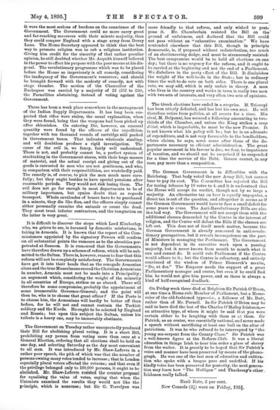The German Government is in difficulties with the Reichstag. That
body voted the new Army Bill, but cannot bear to pay its cost. The Committee has rejected the Bill for taxing tobacco by 18 votes to 4, and it is understood that the House will accept its verdict, though not by so large a majority. An alternative tax on beer is equally unpopular, a direct tax is out of the question, and altogether it seems as if the German Government would have to face a small deficit for some years to come. The Anti-Revolutionary Bills are also in a bad way. The Government will not accept them with the additional clauses demanded by the Centre in the interest of religion, and the Centre will defeat the Bills if the clauses are left out. This does not of itself much matter, because the German Government is already armoured in anti-revolu- tionary prerogatives, but it reveals incompetence on the part of Ministers in managing the Parliament. The Government is not dependent in its executive work upon a passing majority, but it never knows from month to month what it can and cannot do. It could rule Parliament if the Centre would adhere to it; but the Centre is refractory, and entirely convinced of the wisdom of Prince Bismarck's maxim, " Do, ut des." The Emperor needs the support of a great Parliamentary manager and orator, but even if he could find him he would not give him power, and so there is always a kind of half-recognised deadlock.






































 Previous page
Previous page